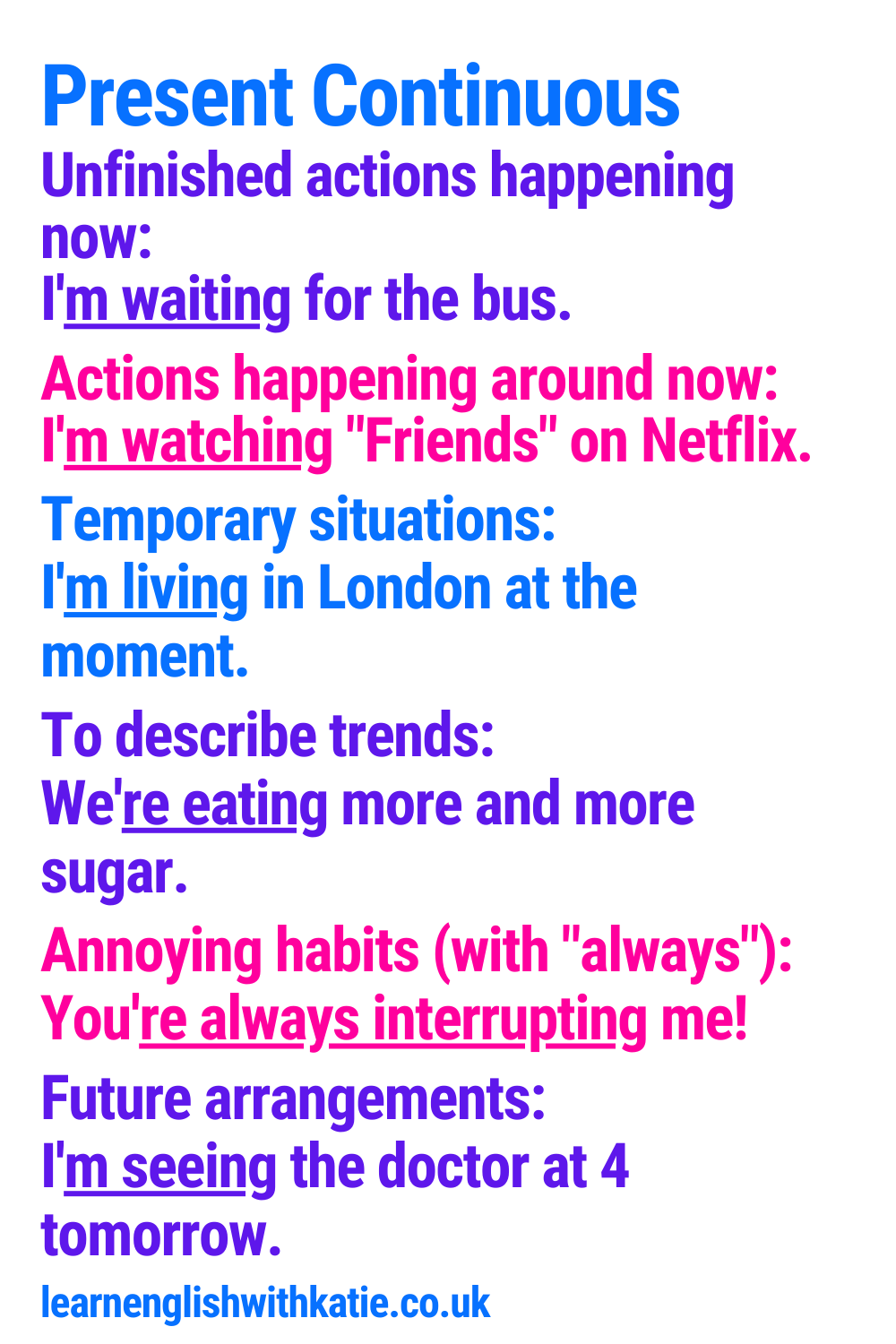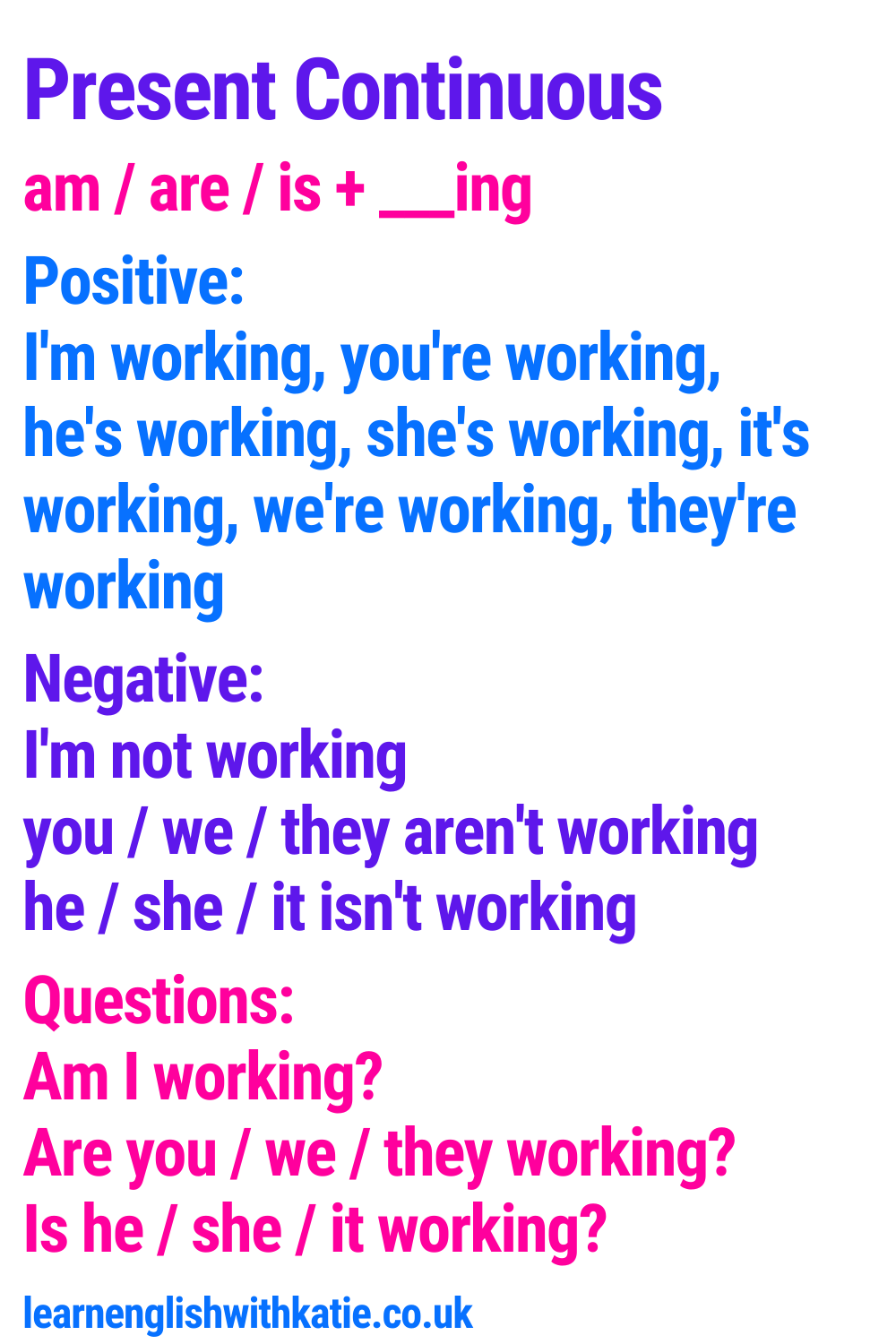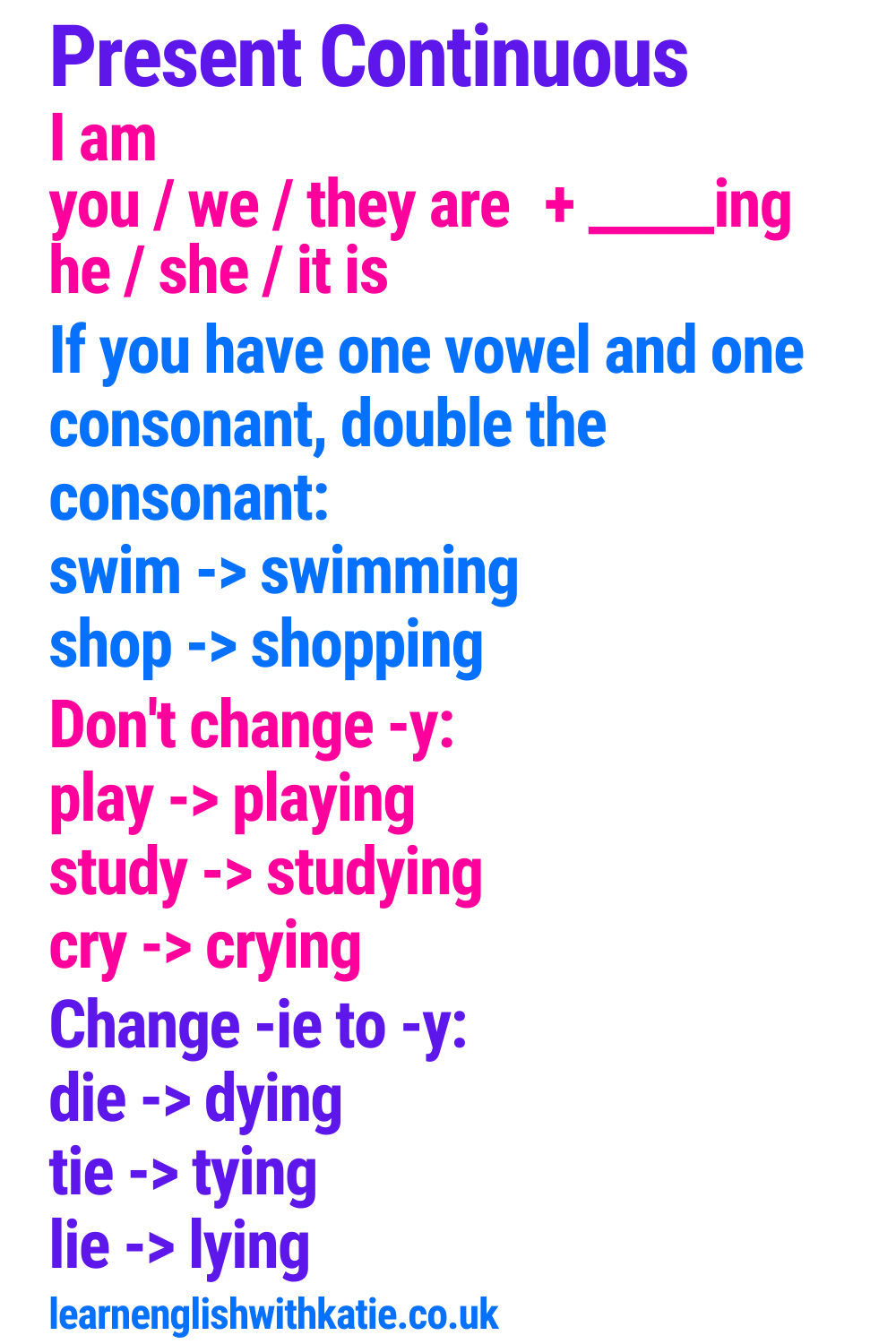|
This tense is mostly used to talk about now but, confusingly, it can also be used to talk about the future. Sometimes it is called the present progressive. As the two names suggest, it is used to describe things which continue for some time or are in progress. Keep reading to learn more. Formation present continuous = am / are / is + ___ing Positive: Be: I am being, you / we / they are being, he / she / it is being (Or: I’m being, you’re being, he’s being, she’s being, it’s being, we’re being, they’re being) Work: I am working, you / we / they are working, he / she / it is working Take: I am taking, you / we / they are taking, he / she / it is taking Negative: Be: I am not being, you / we / they are not being, he / she / it is not being (I’m not being, you / we / they aren’t being, he / she / it isn’t being) Work: I am not working, you / we / they are not working, he / she / it is not working Take: I am not taking, you / we / they are not taking, he / she / it is not taking Questions: Be: Am I being? Are you / we / they being? Is he / she / it being? Work: Am I working? Are you / we / they working? Is he / she / it working? Take: Am I taking? Are you / we / they taking? Is he / she / it taking? Use 1. Unfinished actions happening now: I'm waiting for the bus. He can’t come to the phone - he’s having a shower. 2. Unfinished actions happening around now but not at this moment: I’m reading “The Lord of the Rings”. I’m about halfway through. I’m watching “Friends” on Netflix. (These sentences mean I’m not reading or watching right now but over a period of days or weeks around now. I’m in the middle of the book or series.) 3. Temporary situations: I'm living in London at the moment. She’s working in a different office this week. 4. To describe trends: We're eating more and more sugar. The number of sales is increasing. 5. Annoying habits (with "always"): You're always interrupting me! My mother is always criticising my hair! 6. Future arrangements: I'm seeing the doctor at 4 tomorrow. We’re meeting outside the cinema at 6.30. Common mistakes 1. I studying English. ❌ I’m studying English. ✔️ Don’t forget to include am / are / is. You can’t use the -ing form alone. 2. He don’t working today. ❌ He isn’t working today. ✔️ Only use “don’t” and “doesn’t” with the present simple, not continuous. 3. Do you watching TV? ❌ Are you watching TV? ✔️ This is similar to number 2. Only use “do” and “does” in present simple questions. 4. I’m going to the gym three times a week. ❌ I go to the gym three times a week. ✔️ As I said before, we use present simple and not present continuous for habits. However, you could use present continuous if the habit is temporary. For example: I usually go to the gym once a week but I’m going three times at the moment because I have more free time. 5. He isn’t understanding phrasal verbs. ❌ He doesn’t understand phrasal verbs. ✔️ There are a number of verbs which describe states, not actions, and these are not usually used in continuous tenses. For example: understand, love, know, believe. More on this in a later post. Spelling Verbs ending in -e: If a verb ends in -e, drop the -e before adding -ing. For example: dance → dancing take → taking Except verbs ending in -ee, -oe or -ye: agree → agreeing canoe → canoeing dye → dyeing Double the consonant: If a one-syllable verb has one vowel and one consonant at the end, we double the consonant. This only works if the vowel is short. For example: swim → swimming shop → shopping Don’t double if the verb ends in -w or -x (snow → snowing, fix → fixing) or if there are two vowels (sleep → sleeping) or if there are two consonants (help → helping) If there are two syllables it usually depends on the word stress. If the stress is on the first syllable, don’t double the consonant. offer → offering listen → listening If the stress is on the second syllable, double the consonant: begin → beginning regret → regretting There are some exceptions, of course: In British English, we write “travelling” but Americans write “traveling”. Most other verbs ending in -l work the same way. “Focusing” and “focussing” are both possible, although the first spelling is more common. kidnap → kidnapping Verbs that end in -c: panic → panicking Don’t change the y: play → playing study → studying (NOT studing) Change -ie to -y: There are not many of these. die → dying tie → tying lie → lying Wondering what to study next? You might like to try the present perfect. If you would like more lessons and tips for how to learn English, click the button below and sign up for my newsletters:
2 Comments
14/7/2021 04:40:24 pm
Hi Katie
Reply
Katie
18/7/2021 01:14:36 pm
Thanks for your comments! I know what you mean about that feeling of panic! I have had it myself. I think the only cure is to practise and practise as much as you can because that will build your confidence.
Reply
Your comment will be posted after it is approved.
Leave a Reply. |
About the blogFollow the blog for mini lessons and tips on how to improve your English. Categories
All
Archives
July 2024
|



 RSS Feed
RSS Feed
